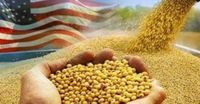On June 5, 2025, Vietnamese Minister of Agriculture and Rural Development Đỗ Đức Duy met with two influential U.S. lawmakers — Senator John Boozman, Chairman of the Senate Agriculture, Nutrition, and Forestry Committee, and Representative Glenn Thompson, Chairman of the House Agriculture Committee. These meetings marked a pivotal moment in strengthening agricultural ties between Vietnam and the United States, reflecting a shared commitment to expanding bilateral trade and cooperation in a sector vital to both nations' economies.
The Vietnamese delegation, comprising leaders from specialized agencies and about 30 businesses spanning grains, meat, fertilizers, biological plant protection products, and the wood industry, arrived in the U.S. with clear objectives: to explore, connect, and promote opportunities for agricultural trade. Their journey included stops in Iowa and Ohio, where significant agreements were forged, and was set to culminate with a forum in Washington D.C. on June 6 with the U.S.-ASEAN Business Council.
At the heart of these engagements were the signing of numerous agreements and memoranda of understanding (MoUs) totaling approximately $1.4 billion. In Iowa, Vietnamese agricultural firms secured four major contracts worth up to $800 million to import corn, soybeans, and meat over the next three years. Notably, Khai Anh Bình Thuận Company inked a $320 million deal for corn, wheat, and soybean meal. Ohio followed as the next strategic stop, where the Vietnamese delegation, alongside Deputy Minister Hoàng Trung and representatives from agricultural associations, signed contracts exceeding $600 million to import corn, dried distillers grains (DDGS), and soybeans.
These deals underscore the complementary nature of the two countries' agricultural sectors. Vietnam exports tropical products such as coffee, cashews, pepper, fruits, shrimp, fish, and wooden furniture, while the U.S. and Ohio provide temperate products like soybeans, beef, corn, raw wood, milk, and dairy products—commodities that Vietnam cannot produce at scale. This complementarity avoids direct competition and instead fosters mutual growth opportunities.
Minister Đỗ Đức Duy emphasized the importance of balancing the trade relationship, stating, “Vietnam and the U.S. both have strengths in agriculture but are not direct competitors. Instead, we can support each other's development.” He highlighted Vietnam’s recent rapid agricultural advances and the need for high-quality inputs, especially high-yield crop and livestock breeds, as well as modern machinery and advanced U.S. technologies to modernize its sector further.
Both U.S. agriculture leaders expressed optimism about the outcomes of the Vietnamese delegation’s visits. Senator Boozman, who has previously visited Vietnam, praised the country's rapid development and viewed it as a reliable and dynamic economic partner in the Asia-Pacific region. He voiced strong support for a fair tariff agreement between the two governments and pledged to relay Vietnam’s proposals to the appropriate U.S. agencies.
Representative Thompson showed particular interest in the high-value agricultural contracts signed and urged the U.S. government to address concerns about proposed tariffs on Vietnamese goods. He also applauded Vietnam’s decision to commercialize genetically modified crops, calling it a proactive step toward agricultural modernization and integration.
The two U.S. officials further advocated for comprehensive cooperation beyond trade, encouraging collaboration between government agencies, research institutes, universities, and academic communities. They extended invitations to Minister Đỗ Đức Duy to visit their home states—Arkansas and Pennsylvania—both recognized for their strong agricultural sectors, to explore further investment and partnership opportunities.
Vietnam has been actively facilitating U.S. producers’ access to its market. To date, 509 U.S. enterprises producing meat and related products and 232 seafood exporters have been registered to export to Vietnam. Significantly, Vietnam is among the first eight Asian countries to accept genetically modified crop products, having approved all 61 registration dossiers submitted by U.S. businesses. As of April 1, 2025, Vietnam reduced tariffs to zero on most U.S. corn and soybean products, further opening the door for increased imports.
On June 6, 2025, a forum held in Columbus, Ohio, brought together 50 businesses from both sides to sign memoranda of understanding worth over $600 million for importing animal feed ingredients from Ohio. Vietnamese companies also connected with Ohio partners to boost imports of raw wood, fruits, and meat. Ohio Agriculture Director Brian Baldridge and Minister Đỗ Đức Duy agreed to propose policies to their governments to prevent supply chain disruptions, recognizing the complementary trade relationship and the potential for expanding bilateral commerce.
Ohio’s agricultural economy currently faces challenges such as rising production costs and falling commodity prices, making the expansion into new markets like Vietnam particularly timely. Patty Mann, Chairwoman of the Ohio Corn Growers Association, described the agreements as a significant win for Ohio farmers, reinforcing Vietnam as a dependable and growing export market. Bill Bayliss, Chairman of the Ohio Soybean Council, noted that Ohio farmers dedicate 4-12% of their land to non-GMO soybeans, which are well-suited to Asian markets for products like tofu and soy milk.
Minister Đỗ Đức Duy called on the business community to enhance competitiveness and standardize production processes to meet growing demand and quality expectations. He underscored that avoiding retaliatory tariffs as high as 46% would benefit Vietnamese producers and farmers while creating jobs in the U.S. supply chain. Moreover, U.S. consumers would gain access to high-quality, reasonably priced agricultural products from Vietnam.
Looking ahead, Vietnamese agricultural importers accompanying Minister Đỗ Đức Duy expressed confidence in a stable and healthy future for bilateral trade. They hope for the early signing of trade agreements with fair tariff policies, considering Vietnam’s status as a developing country with limited income, to strengthen supply chains and prevent market disruptions.
Altogether, these developments signal a new chapter in Vietnam-U.S. agricultural relations, with trade projected to reach approximately $2.5 billion over the next three years. This robust partnership not only promises economic benefits but also contributes to global food supply stability amid an increasingly volatile geopolitical and environmental landscape.


